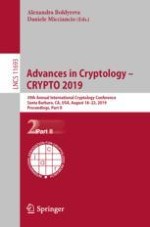2019 | OriginalPaper | Buchkapitel
Leakage Resilient Secret Sharing and Applications
verfasst von : Akshayaram Srinivasan, Prashant Nalini Vasudevan
Erschienen in: Advances in Cryptology – CRYPTO 2019
Aktivieren Sie unsere intelligente Suche, um passende Fachinhalte oder Patente zu finden.
Wählen Sie Textabschnitte aus um mit Künstlicher Intelligenz passenden Patente zu finden. powered by
Markieren Sie Textabschnitte, um KI-gestützt weitere passende Inhalte zu finden. powered by
Abstract
-
Rate Preserving Non-Malleable Secret Sharing. We give a compiler that takes any secret sharing scheme for a 4-monotone access structure (A 4-monotone access structure has the property that any authorized set has size at least 4.) with rate R and converts it into a non-malleable secret sharing scheme for the same access structure with rate \(\varOmega (R)\). The previous such non-zero rate construction (Badrinarayanan and Srinivasan, EUROCRYPT ’19) achieved a rate of \(\varTheta (R/{t_{\max }\log ^2 n})\), where \(t_{\max }\) is the maximum size of any minimal set in the access structure. As a special case, for any threshold \(t \ge 4\) and an arbitrary \(n \ge t\), we get the first constant-rate construction of t-out-of-n non-malleable secret sharing.
-
Leakage-Tolerant Multiparty Computation for General Interaction Patterns. For any function f, we give a reduction from constructing a leakage-tolerant secure multi-party computation protocol for computing f that obeys any given interaction pattern to constructing a secure (but not necessarily leakage-tolerant) protocol for a related function that obeys the star interaction pattern. Together with the known results for the star interaction pattern, this gives leakage tolerant MPC for any interaction pattern with statistical/computational security. This improves upon the result of (Halevi et al., ITCS 2016), who presented such a reduction in a leak-free environment.
